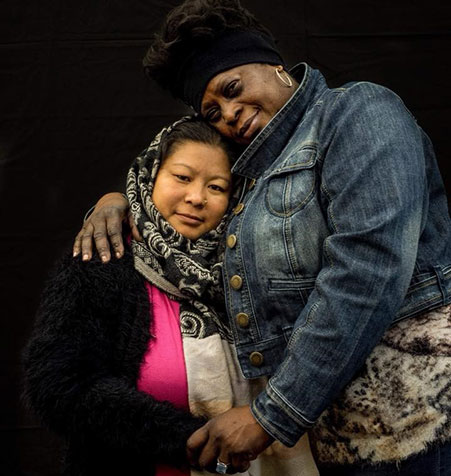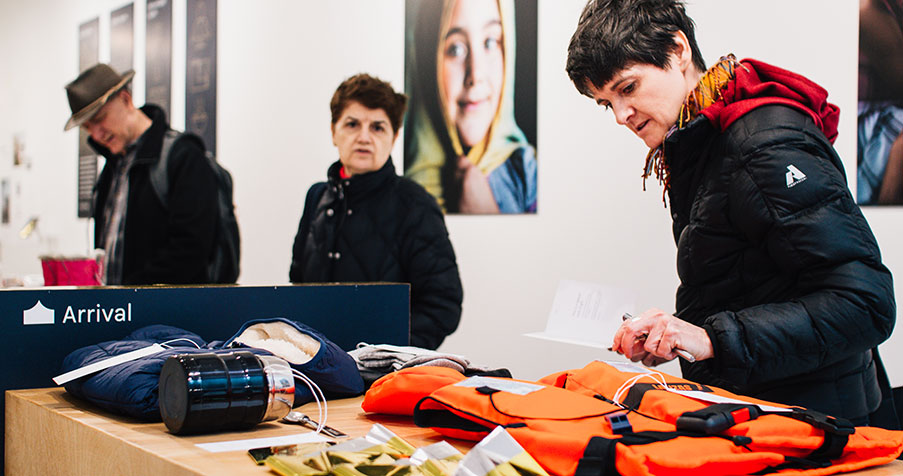Global Whole Being Fund and Help Refugees / Choose Love
Nov 27 2019
RSF’s Raquel Iglesias speaks with Josie Naughton from Help Refugees/Choose Love, and Negar Tayyar from Global Whole Being Fund about working together to support “people on the move.”
Raquel Iglesias: Could each of you tell me about yourself, and what has led you to your current work?
Josie Naughton: I’m the CEO of two organizations that function as one: Help Refugees and Choose Love. We have two organizations because we fundraise in the U.S. and Europe.
I became involved accidentally: in August 2015, I was living in L.A. but was home in London when over a million people arrived in Europe from Syria, the Middle East, and Africa, fleeing war, conflict, persecution, and looking for sanctuary. While I had never considered myself a prolific activist, in this situation, I felt like it was impossible not to help.

Together with some friends I raised money, gathered supplies and took them to Calais, in Northern France, but when we arrived, there were no organizations to help. After partnering with a local association to help with distribution and support services, we realized the best role for us was to focus on what we knew: to raise money by engaging the public. We named ourselves Help Refugees and expanded into Greece, where there was also no governmental body or prominent NGO on the ground. The work was done by incredible locals, refugees, and grassroots organizations. The best way for us to help was to support these groups by raising money and awareness through social media campaigns. In our communication, we were very transparent about where the funds were deployed, which built trust with donors. We branded ourselves Choose Love to help drive home the point that this is a human situation before it is a political one.
It’s four years later and this model is still working. We’re supporting grassroots organizations with funding, but also connecting them to politicians, journalists, and others in this movement. We now support 105 organizations in 14 countries; have had over 30,000 volunteers; raised over $20 million dollars.
Negar Tayyar: Listening to Josie’s story reminds me that we’re in a time where solidarity and acts of loving kindness are crucial amidst political madness, and that every act matters and has ripple effects.
My entry point to this work is twofold; it’s personal and professional. As a refugee myself, I have been uprooted most of my life. I was born in Iran to parents who were part of the 1979 Iranian Revolution and grew up in Germany. Professionally, I have worked in international development, with the U.N. and others, and now in global philanthropy. The Global Whole Being Fund was created in 2015 to dedicate resources just to refugee issues. The idea was to look at human movement and to address the prevailing challenges and on-the-ground gaps. Our drivers are to expand the way people are being presented and to further the discussion of the human dimension. We now use the term “people on the move.” It’s not perfect but illustrates the importance of challenging the prevailing language. People are more than their legal status. We’re also striving to add value to the grassroots sector, who are often first responders who continue their work after an issue disappears from the news, which led us to Help Refugees.
Raquel: Hearing about your relationship and how much respect both organizations have for each other is inspiring. How has RSF played a part in your partnership, and what are your individual relationships with RSF?
Negar: Our work is deeply aligned around the role of weaving in issues of well-being and in using an ecosystem-based approach. With RSF, it’s been helpful to have relationships with staff who have a commitment to and curiosity about these issues so that it feels like we’re all part of the same team. Our work is critical because we respond to gaps which can arise unexpectedly and require a fast response. RSF has done an outstanding job in helping us deploy funds quickly. We appreciate RSF’s commitment to improve processes and to communicate unforeseen issues so that things can progress.
Josie: We’re grateful that in moments where we need to get funding out, we know that everyone is working hard to make it happen. We all feel that our values are aligned.

Shoppers at the Choose Love Holiday Shop. Photo by Help Refugees/Choose Love
Raquel: What would you say is the impact you’re trying to have, and how do you achieve this?
Josie: For us, the initial impact is to meet people’s basic needs holistically. In the places we work, people are in a situation because they have been denied their rights, but they’re also in a dire and immediate situation and need things like tents, food and legal support. The first objective is to meet these needs through incredible grassroots partners who have humanity at the core of their work and are the best suited for figuring out these solutions.
We also advocate for opportunities such as access to education and long-term shelter and other rights that should be awarded to everyone regardless of their location. We advocate for refugee rights, both at the political level, as well as in the public consciousness.
Negar: There are three significant impacts that I see: one that Josie mentioned involves public perception. Secondly, providing support to grassroots organizations to expand and stabilize their efforts by providing access to unrestricted funds is invaluable. Help Refugees has been incubating an entire ecosystem of organizations along migration routes. Finally, the ability to address the tension between meeting immediate and long-term needs is incredibly difficult to prioritize and balance with limited resources.
The individuals we are talking about are rights holders, but unfortunately the responsibility to ensure their rights to access services is being shifted to organizations, which make them so important. People can be displaced for many reasons, as we saw in California with the wildfires, where people’s lives were uprooted for reasons beyond their control. This is a universal human issue, and all of us need to expand our compassion and recognize this, and we try to influence the funding community to shift their perception of these issues.
Josie: The Global Whole Being Fund has supported us from early on, and its commitment to us provided a sense of sustainability that enabled people to create the best projects possible and to plan for the future. It gave the volunteers and organizations the ability to sleep a bit better at night, which was better for their wellbeing, but also better for the wellbeing of the communities that they were supporting, and other funders have followed GWBF’s lead.
Raquel: Shifting gears slightly, Josie, can you share with us a bit more about Choose Love’s retail shop and that unique model, which allows a lot of people to contribute and get involved in your mission?
Josie: Since the beginning, we’ve tried to create innovative ways to raise funds and engage the public. In 2017 we opened the Choose Love Store in London. We’ve modeled the shop like an Apple store and displayed items for purchase for refugee communities—items that shoppers can touch and connect with and then purchase for us to deliver where they’re most needed.
We set up the displays in three stages in the space that mirrored people’s journeys: immediate needs like coats; middle-term needs like tents, and finally future needs section that contained items were a lot more representational. A tissue box represents psychosocial support, a set of housekeys stands for accommodation programs with legal support. In doing this, we wanted to educate shoppers about these different parts of journeys and the importance of thinking of these needs simultaneously.
The first year was a huge success, and in 2018 with the support of the GWBF grant we registered in the U.S. and add a store in New York, and now in 2019, we’re adding another one in L.A.
You can support their work this holiday season!
If you are in Los Angeles, New York, or London, you can shop in person starting on Black Friday, or online at us.choose.love
Negar: Initially, when Josie said in August 2018 that they wanted to open the NYC store on Black Friday, we thought there was no way it was going to happen, but it did! There is magic involved, yes, but it was also Josie’s incredible leadership that made it happen.
Josie: We’re very lucky we work with GWBF, but we’re also amazed that people contribute their time and put their all into it. It’s always something beautiful and inspiring, but unfortunately this is a growing issue. When we started in 2015, there was 65 million refugees. It’s now 70.8 million by U.N. figures and millions more who are not registered or officially recognized as refugees. It’s a huge number, and it’s estimated to be up to a billion people by 2050 because of climate change. This isn’t being addressed and it’s fading out of our consciousness, and important to highlight that this really is a crisis of our time.
Negar: I sometimes hear “this issue is so overwhelming, where to begin,” and it can be hard to find an entry point. This issue affects multiple areas that people feel passionately about whether it’s climate, health, or women’s rights. This issue of forced displacement offers entry points for any area you are working on, and I would encourage everyone to add a refugee-lens to their giving practices.
All photos courtesy of Help Refugees/Choose Love